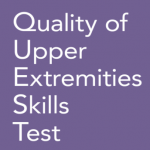Quality of Upper Extremity Skills Test (QUEST)

Summary
The Quality of Upper Extremity Skills Test (QUEST) is an outcome measure designed to evaluate movement patterns and hand function in children with cerebral palsy. This reliable and valid instrument was developed by Carol DeMatteo, Mary Law, Dianne Russell, Nancy Pollock, Peter Rosenbaum, and Stephan Walter at McMaster University.
It consists of 36 items assessing four domains, including: dissociated movements (19 items with one level of response for each item); grasp (6 items with 3-5 levels of response for each item); protective extension (3 items with 6 levels of response for each item); and weight bearing (5 items with 6 levels of response for each item). Items are related to quality of movement, not to chronological age.
The QUEST can be used with children aged 18 months to 8 years old; its administration requires 30-45 minutes and it is intended to be administered within a play context.
The QUEST is suitable as a measure for therapists to use in describing upper extremity quality of movement and for planning intervention programs. It can also be used to track the progress of patients and in academic research.
Therapeutic Areas
- Children aged 18 months to 8 years old with cerebral palsy
Applications
- Academic studies
- Evaluation use
- Clinical trials
Advantages
- Licensed to individuals and to organizations
- Teaching copy version available
Website
https://www.canchild.ca/en/resources/49-quality-of-upper-extremity-skills-test-quest
Contact
MILO Business Development

